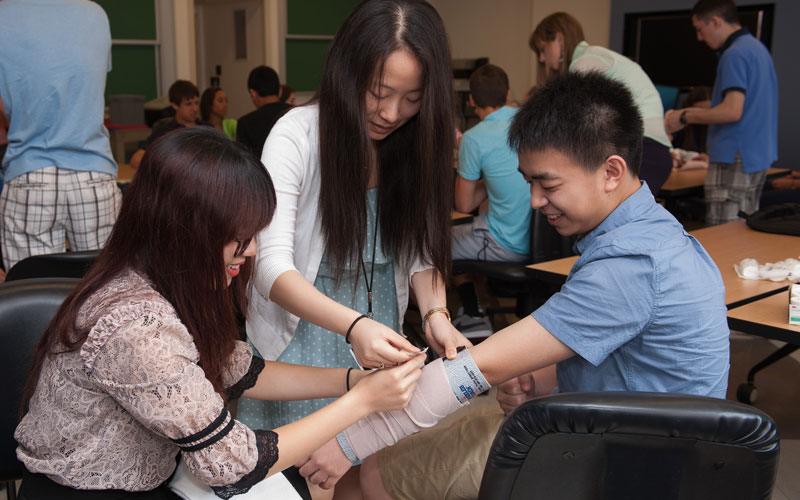Career Roadmap: How To Plan For a Pediatric Career
While most high-school students spend a lot of time thinking about their college major and potential careers, to those thinking about pursuing advanced degrees, it may seem like an even bigger decision. If you are an aspiring physician, for example, you are facing over 10 years of schooling after you graduate from high-school!

This is one of the reasons that it is always a good idea to understand the field you are interested in before jumping in with both feet. In the case of medicine, for example, it is better to shadow a doctor on their rounds and get some classroom experience rather than relying on your favorite medical TV drama – that could set you up for disappointment when you find out what being a doctor is really like.
If you are passionate about working with children and also considering a career in Medicine, you may have thought about merging those passions and pursuing a career in Pediatric Medicine. While there are a vast array of jobs in Pediatric Medicine, one of the biggest interests in the field is becoming a pediatric clinician to work directly with children and their families; whether you are interested in becoming a nurse or doctor, this will require a lot of schooling.
What To Do In High School to Plan for a Pediatric Career
There are typically three groups of people preparing for a career in Pediatric Medicine:
- People that are sure they want to pursue it
- People that want to pursue medicine, but aren’t sure if Pediatric Medicine is the best fit
- And those who are interested in Pediatric Medicine, but unsure if the medical field is the best fit for them
No matter what group you are in, getting experience in a medical setting is going to help you prepare or help you decide as early as possible whether or not a pediatric career is right for you.
For any aspiring clinician, it is important to recognize not only what it will take to get there, but also what it is like once you do. We recommend getting as much exposure, as early as possible, to the different responsibilities that clinicians have. A few good starting points that can be pursued in high school are:
- Get your Basic Life Support (BLS) certification – a CPR certification is good as well, but BLS is usually a little more thorough and directed more to healthcare providers. This is a very basic starting point but is a great way to get an idea of what situations healthcare providers are expected to handle. BONUS: This is something that could literally be life-saving in your day-to-day life, even before you go to go to med school!
- Take any relevant classes in high school that are available – looking at you AP Bio and Chemistry! Depending on your school, you may also be able to take courses such as Anatomy. But, don’t forget some of the other less obvious skills you will need, such as physics, math and even statistics (think about how much of medicine deals with tracking outcomes and probability).
- Explore the medical field outside of school – try to get as much exposure as you can (just not as a patient). This could include medical internships, volunteering, job shadowing and talking to pediatric clinicians about their jobs – if you aren’t sure what type of clinician you would like to be, do your best to talk to both doctors and nurses to see if one sounds like a better fit for you.
- Lastly, make sure this is something you REALLY want and feel led, to do. There will be many challenges and sacrifices that need to be made and both nurses and doctors often report that their jobs are fulfilling, but stressful and demanding.
What Education Do You Need for a Pediatric Career?
To give an example of how much dedication this will take, here are some requirements to become a Doctor (M.D. or D.O.) in the USA:
- Pre-Med classes during Undergraduate – There is usually no specific major, though some schools do offer a ‘pre-med track.’ Many students planning on going to med school will choose something in science, such as biology, and then be sure to fulfill all pre-med requirements. Even more rare are colleges that offer a BS/MD combined program, but they do exist.
- You will need to perform well in all relevant classes – If you are struggling in any related classes, you will want to seek help early because that can start the journey off in difficult territory. Also, you will need to maintain good grades because medical school is incredibly competitive.
- Take the MCAT (Medical College Admission Test) – Once again, med school is very competitive. You will need to score well on this in order to give you the best chance of getting into Med School. This will test your understanding of chemistry, biology, physiology, as well as your analytical ability. Everyone is different, but most pre-med students study routinely for several months prior to the exam.
- Med School – This is typically another four years of school that could easily be described as taking as much effort as a full-time job. The average cost of Med school in the United States is well over $200,000 – if you take out loans, there will also be interest, including that which is accrued if you choose to defer payment during residency.
- Residency – This is generally 3-5 years, depending on whether you want to pair another specialty with general pediatrics. While residents are paid, the salary is often described as not commensurate with the long hours and amount of effort and strain that residents endure during their residency. In 2018, the average resident earned $59,300.
- Fellowship – If you want a narrower focus and want to pursue a pediatric specialty, you can consider another one to three years of additional training. Examples of this would be Pediatric Cardiology or Pediatric Emergency Medicine.
- Board Certification – This is an optional certification that may be pursued in a specialty or sub-specialty.
From start to finish, many doctors say that becoming a physician essentially took over their life between studying and working. While the amount of schooling is substantially less to pursue a career in Nursing, most Pediatric Nurses have at least a Bachelor’s degree, with many pursuing graduate school, such as a Masters or Doctorate in order to get certified as a Nurse Practitioner. From there, some people continue on to gain further training in their specialty, such as Acute Care Pediatric Nurse Practitioners (ACPNP).
Becoming a pediatric nurse is less rigorous than becoming a physician. However, especially if you pursue an advanced degree, it still takes a huge amount of dedication and work to have the opportunity to practice in pediatric medicine.
Summer Programs to Prepare and Experience a Pediatric Career
The Children’s Hospital of Philadelphia (CHOP) offers a Pediatric Medicine summer program for high school juniors and seniors that is modeled after first-year pre-med classes. The goal is to provide a real, unfiltered view of what pediatric medicine looks like on the inside. In addition to classroom instruction, students will get the chance to not only interact with pediatric clinicians at one of the best children’s hospitals in the world, but even make rounds with the physician. This can give amazing insight into the real roles and responsibilities of Pediatric physicians that students may not have previously thought of. For example, how many aspiring clinicians think about documenting a patient’s medical history into an EMR? Not usually the first thing that comes to mind, but this actually constitutes a large part of a clinician’s day.
In addition to attending hospital rounds, classroom instruction, listening to lung and heart simulator and touring a pediatric surgical training lab, you will learn:
- How to place IVs
- How to suture and splinter
- How to draw blood
- CPR
- Ultrasound techniques
Students will stay for two weeks on the historic UPenn campus while working with some of the foremost pediatric medical educators in the world.
This summer program can help confirm that pediatric medicine is something you truly want to do. As most clinicians will tell you, you will need an incredible amount of passion and a strong mission on your journey to practicing medicine, especially if your goal is to become a doctor.



